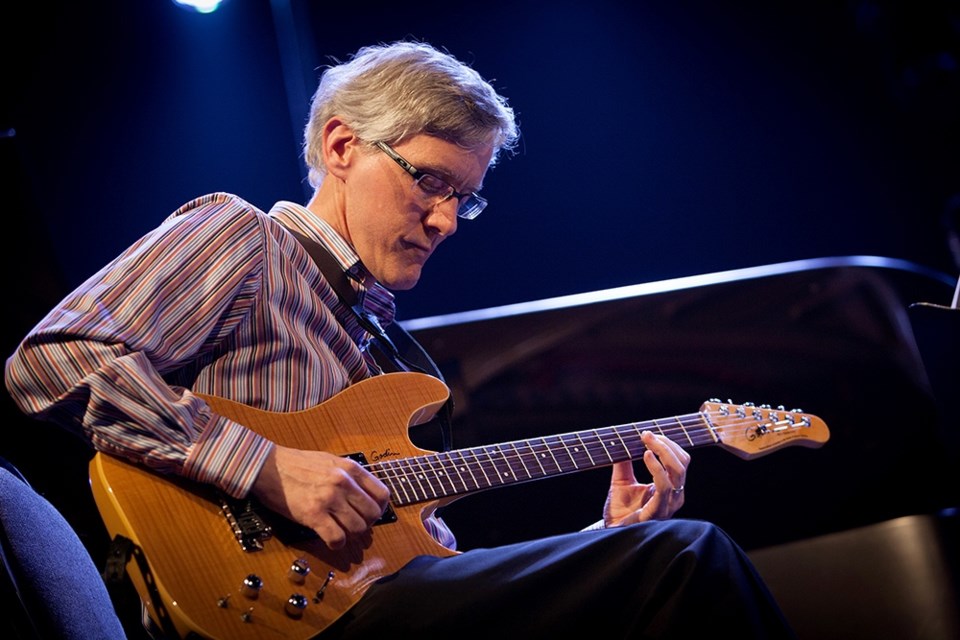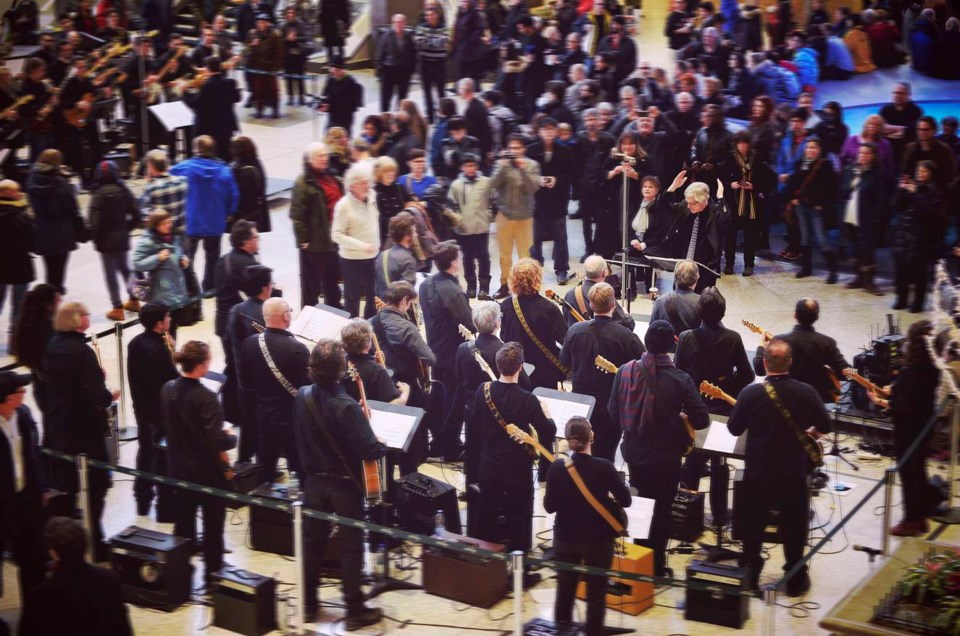Tim Brady knows the vocabulary of the electric guitar. So much so, that in 2015 the acclaimed Canadian composer decided to lead 100 guitars in conversation in the centre of a shopping mall in Montreal.
The spectacle, entitled 100 Very Good Reasons Why ______, drew over 1,000 listeners that day, and unlike the moderators at, say, the recent presidential debates, Brady was actually able to achieve beauty and harmony amidst the noise.
“I’ve played the guitar for 49 years, electric guitar for 45 of those years, so I’ve played pretty much every sound you can make on an electric guitar,” the Montreal-based composer says, with a laugh. “And I have pretty much the entire vocabulary in my mind and in my fingers. So when I go to write for electric guitar what happens is I decide what kind of journey I want to take the musicians and the public on. […] And then I kind of, from this very large sound world that’s in my head, build the journey out of the sounds.”
In fact, despite the cacophonic potential of putting 100 guitars in the same room, 100 Very Good Reasons is melodic and restrained, with the 80 amateur and 20 professional players divided into a pattern consisting of four groups with four overlapping parts, each with their own conductor.
The music unfolds quite slowly, Brady explains, to give the sound waves a chance to travel unobstructed around the space. And, tracked with just a simple stopwatch app, the success of the piece depends on very precise timing.
“We’re working in a very large public space,” Brady says, “and so the music has to be slow enough so that it has time to move around the space. That’s what was really important while I was writing the piece: how can we make sure that the musicians and the public really can feel the movement of the sound […] and hear it moving through space?”

This is not the first time that Brady, one of the world’s foremost composers for electric guitar, has experimented with multiple layers of the same instrument; the inspiration for this particular piece, however, was the 100th anniversary of legendary guitarist Les Paul. Among his many achievements, Paul was one of the earliest guitarists to experiment with overdubbing – the layering of multiple guitar tracks on a single disk – starting way back in the 1930s.
“He was the first guy, ever, to put 16 guitars together and make music,” Brady says. “Now he did his overdubbing by using shellac discs. With no edits, no redos. He had to play every part perfectly. It’s technologically quite a feat, what he did.”
The result of that layering, which Brady pushes to extremes, is a pleasant fuzziness that appeals to the deep recesses of the brain.
“The best example is a symphony orchestra,” he offers, as illustration. “If you go to a symphony orchestra you’ll notice the first violin section has, like, 12 or 14 first violins. And that’s why a violin section sounds so much bigger and denser and more interesting and vibrant than a solo violin – although, nothing against solo violins,” he laughs.
“When you layer an instrument, what happens from an actual technical perspective, is it is actually impossible for two musicians to play precisely together,” he continues. “Even the best musicians in the world are always just slightly off. So when you add six, seven, eight or 100 of them, you get just this slight fuzziness and the sound becomes almost infinitesimally complex, but our brain reduces it to simplicity and in that process we find pleasure.”
If that sounds like your kind of trip, Brady is bringing 100 Very Good Reasons to Vancouver for the first time on Nov. 6 for a free performance as part of the Modulus Festival – Music on Main’s festival of post-classical music (Nov. 5-9). He’ll be joined in the program by a concert of favourites from Vancouver’s Turning Point Ensemble (Nov. 5 and 6), a DOXA co-presentation of the film Lou Harrison: A World of Music (Nov. 7), a performance by Music on Main’s newest resident composer, master turntablist Nicole Lizée, as well as an arrangement (with the Standing Wave chamber ensemble) of such contemporary composers as Andy Akiho, Vincent Ho, Jocelyn Morlock, and Nico Muhly (Nov. 8) to name a few.
Artistic director David Pay calls the festival a “concentration” of what Music on Main does best: engaging and unexpected musical experiences and unique post-classical collaborations in a welcoming environment. Meanwhile, for Brady, the festival is also an opportunity to showcase how far his classically “unclassical” instrument has come.
“What I’ve realized is major social and cultural paradigms shift very slowly,” the Godin guitar player explains. “And the idea that the electric guitar is not just a rock or blues instrument has been with us for about 60 years. But it’s going to take another 60 years for people to see the other option.”
“In the classical world there are still people who assume the electric guitar isn’t a ‘real’ instrument,” he continues. “And the electric guitar community is quite conservative, in its own way. For a lot of them it’s like, ‘Ah man, if you have to read music you’re not playing guitar.’”
• 100 Very Good Reasons Why ______ takes place Nov. 6 at 3pm and 5pm at the Roundhouse. Free.


